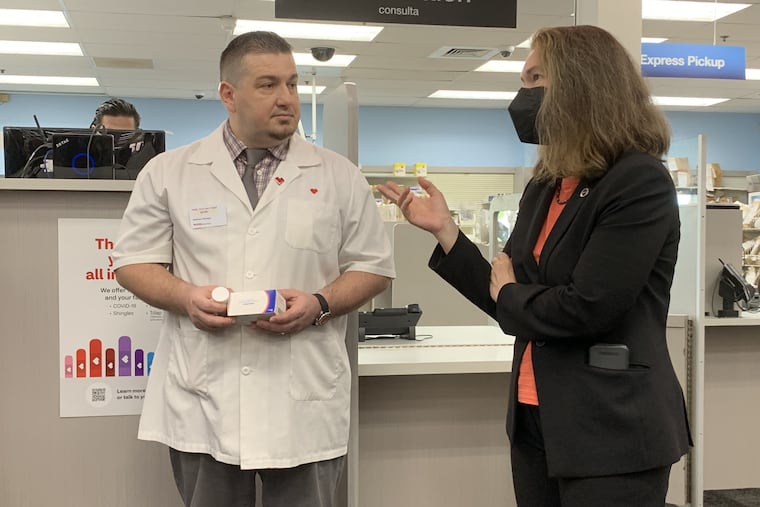COVID treatments are plentiful, but may not stay that way, federal health official warns in Philly visit
A federal Health and Human Services official said COVID-19 treatments, once scarce, are now easy to get. But more funding is needed to keep it that way.

At a CVS in Mayfair, staffers tout the easy availability of once-scarce COVID-19 treatments.
Some CVS stores had been carrying treatments like the antiviral Paxlovid since December, but it was only as recently as the beginning of this month that the supply was plentiful enough for every CVS in the country to carry such drugs.
“We were allocating on demand,” said Lorna Danko, who is implementing oral antiviral and test-to-treat programs for CVS Health.
Easy access of treatment for people with COVID, though, isn’t guaranteed indefinitely. And right now, the federal government doesn’t have the money to replenish supplies of essential treatments, said Dawn O’Connell, assistant secretary for preparedness and response with the federal Department of Health and Human Services.
Monday she visited a CVS on Harbison Avenue to emphasize the twin realities that treatments are plentiful now, but without the $22.5 billion President Joe Biden has requested from Congress, supplies could soon be scarce.
“We do see cliffs for each of these at the current rates,” O’Connell said before the CVS visit, speaking of oral antiviral treatments, monoclonal antibodies that are effective against the omicron variant, and a prophylactic treatment that protects people with weakened immune systems that don’t get the full benefits of vaccination.
Currently, there are about 35,000 locations that carry Paxlovid nationwide.
The monoclonal antibody supply could expire this summer, though, said HHS staff. And oral antiviral supplies could reach concerning levels by the end of the year, though those estimates could change if a concerning new variant develops.
Also concerning, O’Connell acknowledged, were signs of rebound cases among people who had taken Paxlovid, meaning they had a recurrence of COVID after taking their prescribed treatment.
“We’re working with the FDA to study whether they’ll need to adjust guidance around Paxlovid,” O’Connell said.
The department stands by data that found the oral prescription resulted in an 88% reduction in severe illness and death among people with COVID.
As case numbers increase nationwide, CVS executives said they have seen an increase in demand for both vaccines and treatments for the virus. Nationwide, CVS has been administering 65,000 to 75,000 vaccine doses daily, which includes booster shots. That represents an increase over recent weeks, and the pharmacy chain has seen a 65% increase week-over-week in demand for antiviral treatments.
As COVID continues to circulate in the country, managing the virus should include easy access to testing and, for those seriously at risk, the drugs that can combat an infection. O’Connell touted that the federal government was offering another round of free COVID test deliveries, this time allocating eight per household. She also promoted the Test-to-Treat program, launched by the administration in March.
It offers COVID testing, medical staff qualified to prescribe treatments, and a pharmacy that can fill a prescription all in one location. The 20 CVS locations with Minute Clinics, like the one on Harbison Avenue, are participating in Test-to-Treat, which O’Connell described as critical because antiviral treatments like Paxlovid are effective only if given within five days of the onset of COVID symptoms.
They are generally still reserved for people at high risk from the virus.
Test-to-Treat is now available at 2,500 locations nationwide, including health clinics, pharmacies, and long-term care facilities, including at 34 locations within a 30-mile radius of Center City Philadelphia.
The initiative added 50 to 75 new locations in the last week, and the intention is to continue expanding the program, though O’Connell declined to provide benchmarks.
“None that we would say out loud,” she said, “but we are very anxious to expand.”
This story has been updated to correct the number of vaccine doses CVS is administering daily.